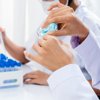Fritextsökning
Artiklar per år
Innehållstyper
-

Study: Popular diabetes treatment is not associated with thyroid cancer
Concerns raised about an association between GLP-1 analogues, used to treat diabetes and obesity, and an increased risk of thyroid cancer are not supported by an extensive Scandinavian study.
-

Assignment: Facilitate the retention of foreign researchers
A newly appointed public inquiry is to develop measures to make attracting and retaining foreign doctoral students and researchers in Sweden easier.
-

The life science strategy – what the industry wants
The process of updating the national life science strategy has begun at the government’s life science office. According to industry stakeholders, Sweden’s competitiveness, the accessibility of health data and the integration of innovation in healthcare are some of the points that are essential to review.
-

Specific proposals and targets top the universities’ desired priorities
What are the universities’ expectations for the update of the national life science strategy? Life Science Sweden posed the question to representatives from Karolinska Institutet and Sahlgrenska Academy.
-

“Life science is important on a personal level”
From the High Coast to the Government Offices. Jeanette Edblad is a native of Ångermanland, and since September last year, she has been Head and Coordinator of the Government’s Life Science Office.
-

Samuel Lagercrantz: ”Will the Swedish life science strategy be updated with precision?”
What will the Swedish government focus on in the life science strategy that is being updated? And what should be prioritized in the strategy? Life Science Sweden's editor-in-chief Samuel Lagercrantz highlights three areas.
-

KI’s new super machine measures brain activity in real-time – “A very expensive hairdo”
Using brand-new, super-advanced equipment, researchers at Karolinska Institutet can now measure brain activity in real-time, with higher resolution than previously possible. “This opens up fantastic opportunities”, says brain researcher Daniel Lundqvist.
-

Ozempic may benefit hip replacement surgery
The high-profile drug for type 2 diabetes and weight loss may be beneficial in other areas. One such area is for patients undergoing hip replacement surgery, a new study suggests.
-

Ingrid Lönnstedt: Demystification of the power of a scientific study
”You surely do realize that even the smallest changes in study assumptions may influence the estimated sample size needed. And how is it even possible to guess the magnitude of the treatment effect before performing the study?” writes Ingrid Lönnstedt in a column.
-

”Information security must become part of the Swedish life science strategy”
Sweden needs knowledge security to stand strong in the global competition, writes Björn Ursing in an opinion article.
-

Unexpected study results on testosterone – no reduction in fracture risk
Testosterone treatment is known to increase bone density and bone quality. However, a study now suggests that supplementation with the male sex hormone does not reduce the risk of fractures, but rather increases it. The researchers behind the study were surprised by this result.
-

Samuel Lagercrantz: We are currently seeing medical breakthroughs in these areas
Samuel Lagercrantz, Editor in Chief of Life Science Sweden, lists three medical fields in which we are currently seeing major breakthroughs and two fields in which we can see some long-awaited positive developments.
-

Anna Törner: The clinical trial – Periscope to reality
What happens to the patients in the clinical trial is not very interesting, writes Anna Törner in a column.
-

A vaccine the world is waiting for: “It can change the lives of many”
A Solna laboratory is developing a vaccine that could save the lives of countless children in low- and middle-income countries. “Working on something that can make a difference for many people is important to me,” says Christine Hägglund, Laboratory Manager.
-

The Swedish innovation model: “There is a paradox”
It is often said that Sweden is strong when it comes to innovation, but how well are we turning that innovation into actual medicines?
-

The Swedish Academy of Sciences: “We have too many researchers”
Sweden does not need more researchers, but it does need better ones. According to the Royal Swedish Academy of Sciences, funding should be distributed to favour excellence.
-

High biological age is linked to a higher risk of dementia and stroke
It is a well-known fact that people age at different rates, and a recent study at the Karolinska Institute suggests that people with a biological age higher than their actual age are significantly more likely to suffer from dementia and stroke.
-

High-tech companies are increasingly focusing on health
Tech companies have been taking an interest in healthcare for many years, and this interest seems to be increasing. “It’s not a sudden shift in trend, it’s more about them advancing their positions,” says Anna Lefevre Skjöldebrand, CEO of Swedish Medtech.
-

“You discover one thing – and then 10 new questions arise”
COVID-19, diabetes, heart disease, and the impact of dog ownership on humans are just some of multitasker Tove Fall’s areas of research. However, her current focus is on her next field: the role of gut flora in human health.
-

The first drugs to slow down Alzheimer’s – but what does it mean for patients?
New treatments for early Alzheimer’s are bringing hope to thousands of patients and their families. The question is, who will get the treatment, how will the right patients be found in time, and will the healthcare system’s resources be sufficient? Life Science Sweden has spoken to Swedish researchers in Alzheimer’s who voice cautious hope but also see further challenges.
-

The Swedish government is to increase its investment in cancer care
The Swedish government wants to invest more in cancer and paediatric cancer care and proposes to allocate SEK 500 million per year for this purpose in the coming years.
-

From the sea of Åland to a self-test for lithium
Four years ago, a meeting on the sea of Åland resulted in the development of a self-test for lithium levels in the blood. The hopes are that the test will be available for individuals with bipolar disorder in the future.
-

Anna Törner: The minute between life and death
“I have never told anyone about this day that happened more than 20 years ago. But I sometimes reflect on what happened, on what might have happened. When I try to understand why I haven’t told anyone, I find the answer: a feeling of shame. There is no forgiveness for something like this, even though it is very human to be distracted for a moment,” Anna Törner writes in a column.
-

Getinge stärker närvaron på läkemedelsområdet i miljardaffär
Getinge förvärvar amerikanska High Purity New England, som tillverkar engångsprodukter för bioprocesser. Den svenska medtech-jätten betalar närmare 1,3 miljarder direkt, men affären kan växa till att kliva över tremiljarderstrecket.